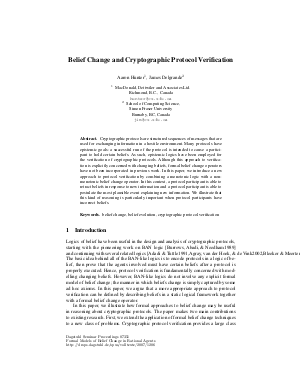Belief Change and Cryptographic Protocol Verification
Authors Aaron Hunter, James Delgrande
-
Part of:
Volume:
Dagstuhl Seminar Proceedings, Volume 7351
Part of: Series: Dagstuhl Seminar Proceedings (DagSemProc) - License:
 Creative Commons Attribution 4.0 International license
Creative Commons Attribution 4.0 International license
- Publication Date: 2007-11-20
File

PDF
DagSemProc.07351.7.pdf
- Filesize: 194 kB
- 14 pages
Document Identifiers
Subject Classification
Keywords
- Belief change
- belief evolution
- cryptographic protocol verification
Metrics
- Access Statistics
-
Total Accesses (updated on a weekly basis)
0PDF Downloads0Metadata Views
Abstract
Cryptographic protocols are structured sequences of messages that are used for exchanging information in a hostile environment. Many protocols have epistemic goals: a successful run of the protocol is intended to cause a participant to hold certain beliefs. As such, epistemic logics have been employed for the verification of cryptographic protocols. Although this approach to verification is explicitly concerned with changing beliefs, formal belief change operators have not been incorporated in previous work. In this paper, we introduce a new approach to protocol verification by combining a monotonic logic with a non-monotonic belief change operator. In this context, a protocol participant is able to retract beliefs in response to new information and a protocol participant is able to postulate the most plausible event explaining new information. We illustrate that this kind of reasoning is particularly important when protocol participants have incorrect beliefs.
Cite As Get BibTex
Aaron Hunter and James Delgrande. Belief Change and Cryptographic Protocol Verification. In Formal Models of Belief Change in Rational Agents. Dagstuhl Seminar Proceedings, Volume 7351, pp. 1-14, Schloss Dagstuhl – Leibniz-Zentrum für Informatik (2007)
https://doi.org/10.4230/DagSemProc.07351.7
BibTex
@InProceedings{hunter_et_al:DagSemProc.07351.7,
author = {Hunter, Aaron and Delgrande, James},
title = {{Belief Change and Cryptographic Protocol Verification}},
booktitle = {Formal Models of Belief Change in Rational Agents},
pages = {1--14},
series = {Dagstuhl Seminar Proceedings (DagSemProc)},
ISSN = {1862-4405},
year = {2007},
volume = {7351},
editor = {Giacomo Bonanno and James Delgrande and J\'{e}r\^{o}me Lang and Hans Rott},
publisher = {Schloss Dagstuhl -- Leibniz-Zentrum f{\"u}r Informatik},
address = {Dagstuhl, Germany},
URL = {https://drops.dagstuhl.de/entities/document/10.4230/DagSemProc.07351.7},
URN = {urn:nbn:de:0030-drops-12065},
doi = {10.4230/DagSemProc.07351.7},
annote = {Keywords: Belief change, belief evolution, cryptographic protocol verification}
}
